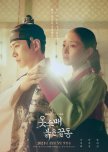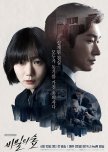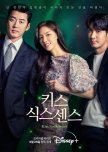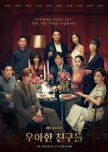
This review may contain spoilers
Romance Based in Historical Realism or Road to Nowhere?
I went into The Red Sleeve fully expecting to love it. I'd been waiting for Lee Jun Ho to be widely recognized as a phenomenal actor since Just Between Lovers, so I was happy to see the praise he received for his performance here. I'm a fan of sagueks too, whether they're the traditional kind or not, and I'm always down to watch an angsty romance between tragic-faced lovers. In a fit of drama-watching naivete, I thought, what could possibly go wrong?And, in the beginning, nothing did!
Lee Jun Ho brought his usual intensity and attention to detail, to say nothing of his aesthetics. Lee Se Young is convincing in any historical role, since she genuinely looks as if she's stepped out of a portrait from the past, while her poise and graceful bearing reinforce the ladylike impression. The supporting cast is similarly strong, the production quality was high, and the introductory episodes felt refreshingly grounded and realistic.
As the story progresses, real cracks emerged. The first issue is how self-aware this show is of itself as a "feminist" narrative, which would've been fine, if that theme had been handled with care and nuance. But it isn't. To boost its girl power credentials, it introduces a secret organization of female palace insiders, but almost immediately undoes its empowered message, by depicting the network as poorly led and one-dimensional in its villainy. Rather than showing women band together for a just cause, it pits the women against the (morally pure, more sympathetic) female lead. To add insult to injury, this outlandish women-fighting-women chapter is distracting and jarring against the tone of the rest of the drama, which had been, up until this point, based in historical realism.
But the biggest problem? The Red Sleeve chases two rabbits, catching neither. All along, the narrative has brought out wonderful tension in the juxtaposition between Sung Deok Im's quest for self-determining independence and her love for Yi San/King Jeongji, which would lead to her dependence on him, as well as strict confinement to the inner palace. The show insists, she must make a choice! [Please don't get me started on how clearly this mirrors the redundant dialogue around women having to choose between career achievement or motherhood. It's so tired, ugh.] By forcing its female lead to choose freedom or love, it also forces itself into a corner: will the story's conclusion confirm Sung Deok Im's self-liberation or her devotion to her lover? In the end, the answer is neither. If the point of this drama was to illustrate how terrible women's lives were in the past, I supposed it achieved its goal, but that's a disappointingly simplistic take on the historic experiences of real women, as well as a frustrating and futile endpoint for a drama that promised to be so much more.
Was this review helpful to you?

60 Episodes of Ni Ni Trying to Generate Chemistry with a Brick Wall
When I first got into xianxia romance in early 2022, this drama was widely recommended as one of the best in the genre. Online, everyone discussed it in reverent tones, as if it was the only xianxia worth taking seriously and a show that could only be appreciated by experienced viewers who could look past its underwhelmed reception and understand its "high art" aspirations. And that's exactly the type of drama I get very, very excited about, because I am pretentious and snobby.But, no. Like, a big no. Don't get me wrong, the production is gorgeous, the leads deliver more nuanced and subtler performances than what you'd usually expect for this genre, and I was deeply impressed that there was a trans or non-binary character with their own love line. It's great stuff!
However, there's exactly ONE requirement for actors in a romance drama: they have to generate convincing chemistry with their co-star. The quality of an individual actor's performance, whether they're a "good" actor or not, is actually less important, in this context, than how well they can establish and maintain a story of attraction and mutual understanding within the boundaries of a couple. Which means an actor can become wildly successful in the romance genre because they create reliable and consistent chemistry with their co-stars, despite delivering underwhelming or inconsistent performances overall (i.e., Xu Kai or Dilraba Dilmurat). The opposite is also true: some "good" actors find themselves in the romance genre, yet fail to work in tandem, rendering their intimate scenes unpersuasive.
And that's exactly my problem with Love and Destiny. For 60 episodes, I watched Ni Ni try to generate chemistry with a brick wall, which was painful when the story frames her as a besotted maiden whose devotion and self-sacrifice knows no bounds. To be clear, I had no problem with Chang Chen's looks, age, or performance outside of their relationship. He's good looking in a football player way and I appreciated his understated approach to the trope-y cold God of War role. Unfortunately, I never - not once! - felt as if the almighty Jiu Chen was sexually or romantically interested in his fan girl, Ling Xi. Without sensuality or any evidence of amorous interest on Chang Chen's side, the couple's scenes are tepid, veering into a surrogate father/daughter dynamic that left me uncomfortable.
Disappointing. Frustrating. Vaguely creepy. These are the words I'd use to describe my slog to finish this lengthy show, and it could've all been prevented, if Chang Chen or the director guiding him had understood the brief. Romance is a team sport. If one person decides they can't or won't play, the whole thing is a loss, no matter how much money, experience, or artistic integrity goes into the game.
Was this review helpful to you?

Delicious pie crust, no filling
I'm definitely in the minority with this one! When Stranger first aired in 2017, it was easy for me to look past, because I wasn't watching many crime thrillers or suspenseful mysteries at the time. But then, Stranger made it onto the New York Times' end-of-year round up of the best international television, and my fear of missing out set in. Had I overlooked something exceptional? After skimming the overwhelmingly positive reviews on this site, I can see that the hype for Stranger is as strong as ever, even six years later.I tried to get into this three times, and it was only the last try that stuck, which probably says everything you need to know about my ultimate reaction to this drama. I forced myself through it, constantly holding out hope that I'd see why everyone enjoyed it so much, but spoiler alert: I didn't.
While I was watching, I didn't notice any huge area of weakness. The writing, while occasionally convoluted or over-baked, was solid. Directing, acting, and editing were great, and as you can tell from the promotional material alone, this drama looked amazing, in its dark and naturalistic way. I had complaints about the pace, but that's such a common issue in Asian dramas, it's barely worth mentioning.
No, my big block was how hollow this story felt. Stranger is certainly sparkling and competent on the outside, as it excels in every category we usually use to evaluate the quality of a drama, but it was persistently vacant on the inside. It left me empty, emotionally and intellectually, and thus failed to capture my interest in any genuine sense. Of course, I realize that this is a story that intentionally focuses on an emotionless protagonist, and I don't have any qualms about his characterization or Cho Seung Woo's subtle and sophisticated performance of Hwang Shi Mok. But I don't think his presence at the center of the narrative is a justifiable excuse for the void at the center of this drama.
And, please don't get me wrong, I don't think every show needs to present an intellectual debate or deliver a huge emotional punch. For instance, some romantic comedies are purposefully built to be fluffy and fun, and thrillers may be emotionally shallow to better blitz through a lightning fast ride of unforeseen twists. However, I don't think that these goals were the ones Stranger set up for itself. It's meant as a "serious" show to be taken "seriously" by its audience, as prestige television. I'm 100% on board with its plan, but the distinction raises my expectations, since that god-tier level suggests Stranger will be bringing something extra to the table, either emotionally or intellectually. Yet, it doesn't. There's no THERE there.
Sure, it's a great show, but no one orders pie at a restaurant expecting nothing but a delicious crust.
Was this review helpful to you?

I'm a Pet at Dali Temple? More like, "I'm a Hostage of a Sexist Drama"
When I think about dramas that I wish didn't exist on this material plane, I'm a Pet at Dali Temple comes to mind. I chose to watch this after enjoying Gia Ge's exceptional performance as a cat-human in Make a Wish. I'd also just finished a surprisingly successful streak of pastel-filtered sweet romances (they're not usually my thing, I have trouble paying attention once everyone gets cozy), so I thought this would fill that void nicely.But, boy oh boy, was I unprepared for the misogyny! While I love the enemies-to-lovers "bickering couple" trope, it doesn't work if it's entirely one-sided, as it is here: the male lead frequently and persistently berates the girl he professes to love. In a toxic cycle, Qing Mo Yan withholds pertinent information from Ru Xiao Lan, which makes her deeply unaware of herself and the world around her, then punishes or yells at her when she inevitably acts out of ignorance. She isn't given any narrative space to mature because he's insistent on keeping her in the dark and treating her like a child.
And as if the verbal abuse wasn't repulsive enough, there's also the noticeable age gap in characterization and performance, between manly Xu Kai Cheng and girlish Hu Yi Xuan. Unsurprisingly, the character of Xiao Lan is underwritten and cliche, since she's supposed to be mischievous, carefree, and juvenile in her blind kindness, like every other female lead in a fantasy C-drama. Meanwhile, Mo Yan is mature, responsible, and measured in his trust in others, like any normal grown adult. This giant difference in personality and experience might've been reduced, had the actors generated any persuasive chemistry, but they don't. Without any sensuality or sense of deepening emotional intimacy, their romance takes on a creepy sterile quality, making them seem more like father/daughter or brother/sister. None of this is helped by their aesthetics. Although Xu Kai Cheng and Hu Yi Xuan are actually only four years apart in age, he looks far older while she appears far younger.
The ending, which I won't spoil, puts the rotten cherry on top of the disgusting sundae, further proving that this show thinks its creepy father/daughter dynamic is part of its appeal.
After watching this and A Well-Intended Love, until it became a horror movie, I'm left scratching my head at Xu Kai Cheng's choice in projects. Does he look for sexist scripts or do they just find him? I've heard the rumors about his struggles with honesty and fidelity in his personal life, but you'd think that would be an even bigger reason to steer away from projects that gleefully demean women, or...not.
Was this review helpful to you?

This review may contain spoilers
Kiss Zero Sense? Fun nostalgic watch turns into caricature chaos
I watched Kiss Sixth Sense out of nostalgia. When I began watching Korean dramas in the early 2010s, so many of my favorite shows were like this one: contemporary romantic comedies with a workplace setting and a speculative or low fantasy spin on the central relationship. Back then, it was common to see two aspiring love birds communicate telepathically (I Can Hear Your Voice), swap bodies (Secret Garden), or travel through time (Rooftop Prince, Queen In Hyun's Man), and these outlandish scenarios were hilarious, of course, but the showrunners would also use them to tease out deeper or more complex themes, like the role of destiny in our lives, how we all perform gender, and the discovery of connection in the unlikeliest of places. Now, it seems as if this style of romantic comedy is falling by the way side, and shows like this, Jinxed at First, and Link: Eat, Love, Kill represent a dying breed.Sadly, just as this sub-genre has receded into background, this drama paled in comparison to its predecessors.
In the beginning, I was charmed. I hadn't encountered Yoon Kye Sang in anything before, so even if this was one of his weaker performances, as a few of the reviews here mention, I couldn't tell, and I found myself enjoying his unexpectedly grounded, realistic portrait of the stereotypical cold boss ML. More surprisingly, this show really leans into the throwback version of this trope: Cha Min Hoo is a legitimate workplace bully, whereas today this type of character is watered down and far from toxic (see: the ML in Business Proposal). Obviously, this behavior is unacceptable in real life, but I thought his low starting point hinted at more character development.
Seo Ji Hye brings a similar levelheadedness to her performance as Hong Ye Sul, the long suffering employee working directly under Cha Min Hoo, and I enjoyed how the polished, more lifelike leads acted as a counterweight against the offbeat premise.
From the start, it's easy to see that Ye Sul needs to go on her own journey of professional growth: she doesn't stand up for herself when she's bullied by her superiors or targeted by undermining, jealous co-workers. She's a detail-orientated, hard working employee who doesn't whither under her boss' endless criticism or impossible standards, but she has yet to find her voice or emerge from beneath the safe umbrella of Min Hoo's mentorship. When she leads a meeting in front of important clients and they question her presentation, it's Min Hoo who steps up and lends her credibility. I was excited to see how this drama would show Ye Sul fighting these (often sexist) standards and confidently coming into her own.
From the beginning, I was fully hooked, watching episode after episode with interest. I was especially impressed with the scenes leading up to, during, and immediately after Ye Sul and Min Hoo's accidental first kiss. The scenes beforehand, when we see Min Hoo's intense preparedness during the weather snafu, pull double duty: revealing how he may have secretly looked after her for years and suggesting that this diligence may have contributed to his success in this industry. Then, we get this fantastic tension between the panic of the rainstorm and the sensual scenes of Ye Sul's first vision of their future, which are unexpectedly hot (not hot-for-a-Korean-drama, but hot-HOT). Afterwards, their varied reactions are intriguing: Ye Sul is understandably shocked to see Min Hoo in such a wildly different context while he's avoidant and distant, suggesting a whole new set of mysteries and backstory.
In the middle of the drama, once the couple get serious about their relationship, things started to wobble. For me, the biggest problem was the lack of relationship development between the main leads. Do we see Ye Sul gradually fall in love with her longtime antagonist? No, not really. Instead, there's this pervading sense that she's simply giving into the curiosity stirred by her sexy visions (really, who can blame her?!). When they agree to date, the decision reads like it's "legitimatizing" their future sexual relationship, rather than coming from a place of increasing emotional intimacy. Enemies to lovers romances require careful relationship building and scenes in which the characters go through phases of connection until their once-hostile bond is grounded in romantic love (Alchemy of Souls and Mad for Each Other are GREAT at this!). Here, we're fast tracked past the best parts of this trope for...what, exactly?! I couldn't tell. Zipping through the relationship building ill-serves the pace of the drama later on, that's for sure.
Smaller wobbles build elsewhere: the sabotage subplot outlasts its welcome, the stalker's delusions don't fit beside his otherwise high functioning life, and Lee Joo Yeon's "toxic love rival" role is dated (for a reason!) and pointless, since it's clear that Min Hoo isn't interested, like, at all. Ye Sul and Min Hoo's coded kiss cues are fun enough, but feel juvenile after the steamy blast that we know we're headed for. Small potatoes like these are fine, as a side dish, however here they're often served as the main course, which simply isn't enough to satisfy.
There are other opportunities lying around, as Kiss Sixth Sense possesses a deep bench in its strong supporting cast, yet this potential is repeatedly squandered. Kim Ga Eun is as cool and effortlessly watchable as usual and I found myself charmed by her gender-flipped, fast-burn secondary romance with Tae In Ho's "aw shucks!" good guy doctor, but at the last minute, their subplot runs straight into a big brick wall and her character is reduced to an inexplicably unfeeling, one-dimensional distraction. Worse yet, what the show does with Kim Mi Soo is downright criminal: asking a talented actress with a broad range to speak in a baby voice and cry through 12 episodes is an unpardonable sin. I'm also a huge fan of Hwang Bo Ra's eccentricity but here she's either terribly miscast or poorly directed (or both?) since her wild energy never matched Seo Ji Hye's sophisticated aura. It was impossible for me to envision those two characters as workplace buddies.
However, if this drama had knuckled through with its humdrum efforts, my rating wouldn't be so low. I could've tolerated the lack of relationship building, the misuse of talented actors, and even the poorly executed bits and bobs which this show wants to substitute for the main event (i.e., a well built romantic arc!). After all, the central theme -- that romantic relationships are unpredictable and it's impossible to guess their final outcome, yet we must remain hopeful and courageous regardless -- sits well with the supernatural premise. This concept is reinforced smoothly by Ye Sul's personal hesitancy and her questions about the role of fate and free will in her visions. Min Hoo's struggle to open up and share his own unusual power or disability is similarly poignant. Unlike a lot of reviews on MDL, I thought these themes fit the actors' ages perfectly. Like a lot of people in their thirties, they've "settled into" themselves, but it has taken on an edge of complacency, wherein Min Hoo's secretiveness and Ye Sul's self-doubt limit their ability to connect with one another. Again, if this now-mediocre drama had floated along on the back of good stuff like this, I would've given this show a 7.
But, no. First, the show panics and acts as if it doesn't have any material left (let me say once more: propelling past much-needed relationship development to rush the couple together was a bad idea!). Then, the script becomes totally and completely unglued. I expected this show to follow through on its own concepts, like revealing how Min Hoo grows out of his abusiveness at work. I was also really, really looking forward to seeing Ye Sul find her voice, earn her accolades independently of Min Hoo, and speak up for herself during confrontations. Her jealous co-workers repeatedly bring up this idea that she owes all of her success to Min Hoo and their mentorship isn't based on the quality of her work but her ability to attract him as a woman, which is gross and sexist. But then, the drama doesn't do anything to refute that perspective! Instead, Ye Sul achieves career advancement through Min Hoo's intervention, mimics his abusive communication as a boss, and behaves in an extremely childish way when she encounters her partner at the office. Episode 12 convinced me that she should be fired, tout de suite -- which should NEVER be the final note of a workplace rom com!
After the complete mismanagement of plot and pace, this drama makes a last ditch effort to find material by introducing an entirely new theme, halfway through its last episode. In a tone deaf turn towards realism, Kiss Sixth Sense wants its audience to contemplate how relationships require emotional work, compromise, and re-commitment after the initial Happily Ever After. Which is both a true fact of life, and a concept that wouldn't be out of place in a second chance romance or naturalistic prestige drama, but this show isn't either of those things. Oh, and it also wants to sell us this nonsense in 30 minutes. What do we get? Pure chaos, and not the good kind. We're subjected to a half hour of these mature, thoughtful actors running around like chickens with their heads cut off, fighting bitterly and insulting one another over imagined conflict. It's more than enough to convince me that this pair should've never gotten together in the first place, completely undermining the story that this drama has been telling for 11 1/2 episodes. By turning Ye Sul and Min Hoo into obnoxious caricatures, Kiss Sixth Sense abandons its own story, and when showrunners show such disrespect for their projects, it disrespects the audience who has been faithfully following along, and I can't stand that.
Was this review helpful to you?

This review may contain spoilers
Ends as gracefully as a belly flop
From the start, I knew this drama and I probably weren't going to be a love match, as middle-aged emasculation isn't a theme I typically resonant with, but I was curious enough to give it a try since the ensemble cast is ridiculously solid. It also seemed like a good drama to watch with my mom: we'd just finished Misty and loved it, and Graceful Friends is recommended as a similar show. But boy oh boy, was I wrong! The comparison isn't doing Graceful Friends any favors, especially when considering the writing and lead actress performances side by side.Everything goes smoothly enough in the beginning. Although their characters are very, very different personalities, the four male leads sell their long-standing friendship flawlessly. In fact, the loose humor and easy camaraderie between the characters of An Goong Cheol, Jung Jae Hoon, Jo Hyung Woo, and Park Choon Bok are by far the strongest parts of this drama, so if you're someone who likes ensemble dramas centered around an unlikely group of friends, then I'd recommend you try Graceful Friends. That's not what I usually go for, but I can definitely understand the appeal of, like, a middle-aged man version of Age of Youth. As we have our pants charmed off by this gang of goofball friends, the show -- gracefully! -- sets up its mysteries and suspenseful secret/conspiracy road signs.
As the story progresses, cracks begin to form. First, the tone of the show becomes discordant: the silly mischievous antics of the friend group, along with the over the top performances by a few of the side characters, becomes too strange against the increasingly dark subject matter of infidelity and murder. Then, the show tries walking the line between melodrama sub-genres; hopping back and forth between "gotcha!" makjang twists and more subtle or sophisticated dialogue, which is reminiscent of a prestige drama. Finally, there's the issue of Song Yoon Ah and her interpretation of the female lead, Nam Jung Hae. Much of the plot rests on this morally ambiguous, professionally-driven and insecure woman, yet it was impossible to discern any depth or complexity in Song Yoon Ah's performance. She's flat, which does nothing to explain how two men have been in love with her for decades nor does it build connection for viewers, particularly those who are already disinclined to lend her sympathy as the secretive wife-villain who low key loathes her son (Speaking of, why doesn't she like her son? Spoiler alert: we never find out!) . The problem worsens as other female characters, like Kim Hye Eun's competent ex-adult film actress and Han Da Gam's effervescent "first love" interloper, come into greater focus. My mom and I found ourselves wanting to see more of them and hoping Goong Cheol would choose Hae Sook.
No matter how precarious and disjointed the middle, my mom and I were still on board. We wanted to solve the story's central mysteries and see resolution for the characters we had grown to care for. Unfortunately, none of that happens, and it's as if the writers just, I don't even know, lost interest? Some of the narrative arcs, which were carefully crafted over the course of the entire show, like the messy ties between Jung Hae and her rival Hae Sook, get waved away by a single conversation (unsatisfactorily, I might add: only one woman expresses remorse and apologizes, while the other, who is arguably more responsible for the pain of their relationship, stays silent). Similarly, the answer to big suspenseful questions, like who caused the professor's death 20 years before, are revealed with all the fanfare of a mild yawn. Central characters die -- or are brought back from the brink of death! -- entirely off screen. The final two episodes devolve into a string of dated plot conveniences, the type that were common in dramas from a decade or two ago, which are meant to keep us watching but don't offer any meaningful resolution.
When we finished this drama, my mom asked me, "What do you think was the message or theme of this show?" and my first thought, which I mentioned at the top, was middle-aged, middle-class male emasculation. Again and again, this show returns to story lines in which the men are cornered into humiliating circumstances, acquiesce to abusive superiors, and/or receive much-needed financial or professional assistance from their more successful wives. Their regular meet ups consist of bemoaning the role they play as put-upon husbands or frustrated employees; their intimate relationships are deeply shaming, whether they're the playboy husband kept by a wealthy older woman, the bread winning partner of a gorgeous young housewife, the emotive youngest son of a conglomerate family, or the do-gooder executive in a lucrative if legally questionable fried chicken franchise. In the starkest example of emasculation fear, one character instructs another to avoid confessing a crime to the police, insisting that he wants to save face as a man and would resent the damage to his reputation as a husband, if the truth were revealed.
What are we supposed to make of all this? It's impossible to say, since by the time the drama can answer that question, the script is in shambles. Unfortunately, one big thing becomes clear: this show is NOT a multi-dimensional exploration of middle-aged emasculation and the strengthened bonds of friendship that see these men through their struggles. Instead, it's a simplified confirmation that yes, these men ARE being emasculated, and, uh, it's wrong, but they "protect what they need to protect AS MEN" by staying close to their man friends. We also get some limp gesturing about how life deepens for people in their forties and a few nonsensical scenes about Goong Cheol and Hyung Woo breaking from their roles as children, by disavowing or clinging to their parent, respectively. Now, call me crazy, but it's impossible to see how Goong Cheol evidences growth or maturity when he rejects his father's profound apology, especially when his father explains that he'd once gone through THE EXACT SAME SITUATION that his son has just experienced.
This isn't a bad show, by any means, but it is a show that squanders its potential in the shallowest way possible. Graceful Friends could've utilized its group of young actors in flashback scenes to add depth to the characters' relationships in the present, but it doesn't. It could've explored how Goong Cheol and Jae Hoon exist as two sides of the same coin, both mild-mannered men who hide their festering rage and capacity for violence, but it doesn't. It could've dove into how the most intense youthful relationships are marked by affection and rivalry in equal measure, but it doesn't. It reduces Jung Hae into villain then victim then tragic idealized first love, without ever bothering to fully examine at her self-loathing or capacity for cunning. It blithely skips by Goong Cheol's maladaptive denial and Hyung Woo's infuriating infantilism. Aside from this obvious waste, the drama introduces and then fails to follow through with its own mysteries, like the dubious parentage of Yoo Bin or the mysterious person who tidies the crime scene, as if it simply doesn't care anymore, and when I realize a script doesn't care about its own narrative, it makes my investment in the show feel pointless. And if I had the choice between a bad show and a show that disrespects my commitment as a viewer, I would prefer the former every time, which is why this not-bad show still earns such a low rating from me.
Was this review helpful to you?









